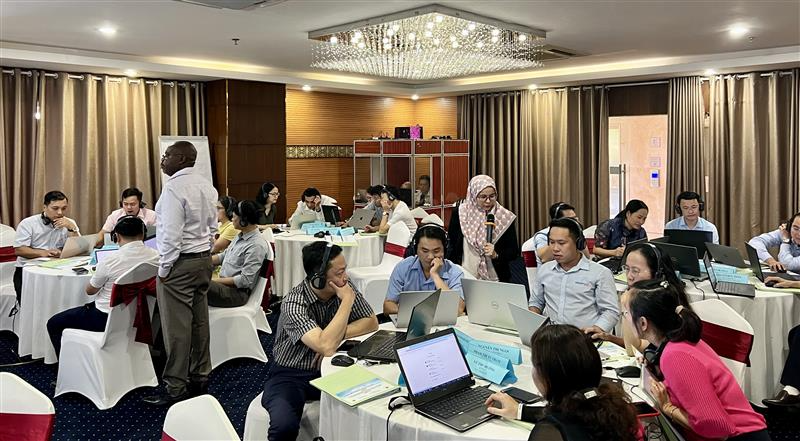
Quang Nam (Viet Nam), 22 January 2024 – Ransomware is becoming a growing concern in Viet Nam. With 13,900 cyberattacks in 2023 alone, the country ranks third among those most affected by this form of cybercrime in Southeast Asia. Understanding the danger behind such attacks, which are growing every year, Vietnamese criminologists and law enforcement agencies are strengthening their capacity to combat cybercrime with the support of the United Nations Office on Drugs and Crime (UNODC).
As part of a series of capacity building activities geared to strengthen their technical skills, investigators, prosecutors, and judges from across the country were trained in countering cybercrime and cyber-related offences last week in Quang Nam, central Viet Nam. They learned the intricacies behind collecting, investigating, preserving, handling, and managing digital evidence during a ransomware attack.
“Projections show that, in Viet Nam, ransomware attacks will increase. These consist of malicious software attacks in which a criminal sneaks into your computer, locks your files through encryption, and demands a ransom for them,” said Himal Ojha, digital forensics expert at UNODC’s Regional Office for Southeast Asia and the Pacific who conducted the training. “The attacks usually lead to data loss, even after the ransom is paid, intellectual property theft, and system and network disruptions.”
According to Viet Nam’s National Cyber Security Center report, organizations across Viet Nam suffered almost 14,000 cyberattacks in 2023. This represents a 9.5% increase compared to 2022. Eighty-three thousand computers and servers were attacked from 2022 to 2023, whilst from 2020 to 2021 ransomware attacks in the country increased by nearly 200%.
“The development of digital technology has had a profound and comprehensive impact on all socio-economic sectors of the country, on life and people,” said Lai Viet Quang, Director General of the Department of Public Prosecution and Supervision Over Criminal Adjudication at the Supreme People’s Procuracy of Viet Nam. “Viet Nam, through its policy to promote the application of digital technologies to serve socio-economic development and ensure national defense and security, has achieved a lot in this field. However, increasing connectivity and anonymity are also helping cybercrime.”
To keep up with criminal groups, hundreds of law enforcement experts from agencies across Viet Nam are working with UNODC, updating their know-how to prevent and combat the crime. These efforts are aimed at enhancing capacities to combat and conduct investigations, in line with the country’s law enforcement pillars: deployment of task force, prevention and investigation, and international relations.
Each capacity building activity also offers an opportunity for officers of the Supreme People’s Procuracy of Viet Nam, high-tech crime investigation police, and the computer emergency response team to learn and share practices on digital evidence used to resolve cases related to cybercrime in general and ransomware in particular. It brings together multiple agencies in the country to exchange experiences and challenges.
Currently, Viet Nam’s Cybersecurity Emergency Response Teams/Coordination Center (VN CERT/CC) at the Ministry of Information and Communication is leading the development of national guidelines on how to assess the maturity level of the country’s Computer Security Incident Response Team.
“Understanding these processes according to international standards and receiving the most up-to-date information for our reference is key for us to develop operating procedures that will meet the requirements that Viet Nam is aiming for,” said Bui Thanh Ha, Officer-in-Charge of VN CERT/CC in Da Nang, Viet Nam.
Click here to learn more about UNODC’s Regional Office for Southeast Asia and the Pacific.
Click here to learn more about UNODC’s work on cybercrime.